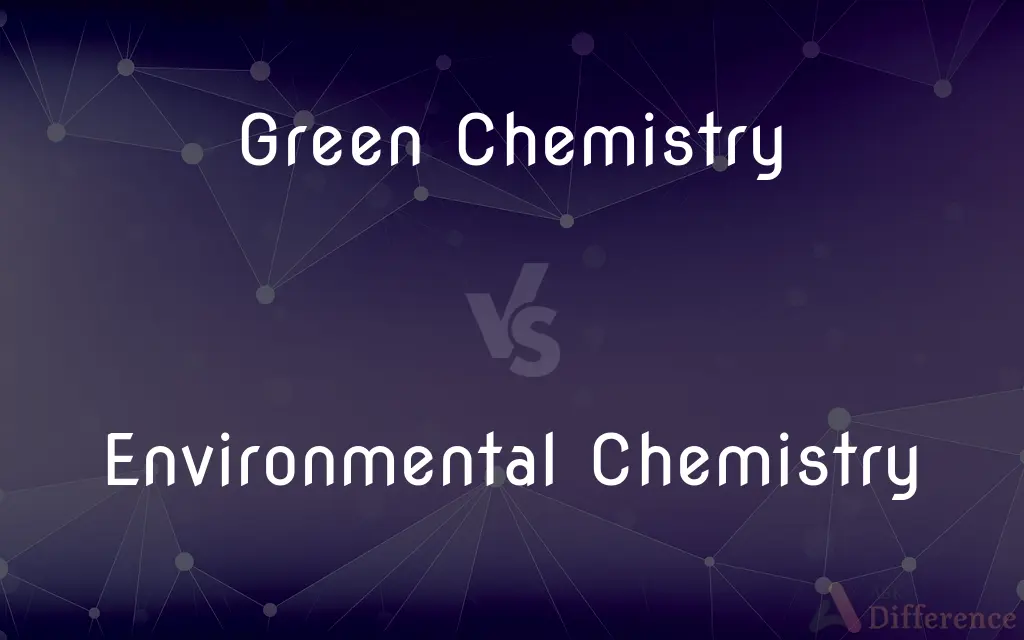Green Chemistry vs. Environmental Chemistry — What's the Difference?
By Tayyaba Rehman — Published on January 22, 2024
Green Chemistry focuses on designing products and processes that minimize environmental impact; Environmental Chemistry studies chemical processes occurring in the environment.

Difference Between Green Chemistry and Environmental Chemistry
Table of Contents
ADVERTISEMENT
Key Differences
Green Chemistry is an innovative approach in chemistry aimed at designing products and processes that reduce or eliminate the use and generation of hazardous substances. Environmental Chemistry, on the other hand, deals with the study of chemical and biochemical phenomena occurring in natural places, focusing on the impact of human activities on the environment.
The goal of Green Chemistry is to create more sustainable and environmentally friendly chemical processes and products. It encompasses everything from reducing waste and toxicity to increasing efficiency of chemical reactions. Environmental Chemistry is concerned with understanding how pollutants affect the environment, including air, water, and soil chemistry.
Green Chemistry emphasizes the prevention of pollution at the molecular level and is a proactive approach. It seeks to design safer chemicals and processes. In contrast, Environmental Chemistry often deals with remediation – the treatment and cleaning up of pollution after it has occurred.
Green Chemistry principles are applied in research and development across various industries to create eco-friendly products. Environmental Chemistry involves monitoring and assessing environmental samples to understand and mitigate the impact of pollutants.
While Green Chemistry is about innovation in chemical research and industrial practices for sustainability, Environmental Chemistry provides the scientific basis for understanding environmental challenges, often informing and justifying the need for Green Chemistry practices.
ADVERTISEMENT
Comparison Chart
Focus
Designing eco-friendly processes and products
Studying chemical processes in the environment
Goal
Prevent pollution and minimize environmental impact
Understand and analyze environmental pollution and its effects
Approach
Proactive in preventing pollution
Reactive in studying and mitigating existing pollution
Applications
Sustainable industry practices, safer chemicals
Pollution analysis, environmental monitoring, remediation
Key Principles
Reduce waste, improve efficiency, minimize hazard
Assess environmental impact, study pollutant behavior
Compare with Definitions
Green Chemistry
Green Chemistry focuses on sustainability in the chemical industry.
Creating renewable energy sources is a goal of Green Chemistry.
Environmental Chemistry
Environmental Chemistry examines the effects of pollutants on nature.
The study of acid rain's impact on forests is a part of Environmental Chemistry.
Green Chemistry
Green Chemistry involves developing safe, non-toxic chemical products.
The creation of environmentally friendly cleaning products is inspired by Green Chemistry principles.
Environmental Chemistry
Environmental Chemistry involves monitoring environmental pollutants.
Measuring air quality in urban areas requires knowledge of Environmental Chemistry.
Green Chemistry
Green Chemistry is the design of chemical products and processes that reduce environmental hazards.
The development of biodegradable plastics is an application of Green Chemistry.
Environmental Chemistry
Environmental Chemistry assesses the chemical composition of environmental samples.
Determining the levels of heavy metals in water is done through Environmental Chemistry.
Green Chemistry
Green Chemistry promotes the use of renewable resources.
The shift from petroleum-based to plant-based chemicals is driven by Green Chemistry.
Environmental Chemistry
Environmental Chemistry studies chemical processes in the environment.
Analyzing soil contamination involves Environmental Chemistry.
Green Chemistry
Green Chemistry aims to minimize waste and pollution from chemical processes.
Using catalysts to reduce harmful emissions in industrial processes reflects Green Chemistry.
Environmental Chemistry
Environmental Chemistry helps in developing pollution remediation methods.
Creating methods to clean oil spills is an application of Environmental Chemistry.
Common Curiosities
What do Green Chemists do?
They innovate safer, more sustainable chemical products and processes.
Can Green Chemistry prevent pollution?
Yes, it aims to prevent pollution at its source.
How does Green Chemistry benefit the environment?
By reducing chemical hazards and waste, promoting sustainability.
What is Green Chemistry?
A field focused on designing environmentally friendly chemicals and processes.
What is Environmental Chemistry?
The study of chemical processes in the environment.
What role does Environmental Chemistry play in society?
It helps understand and solve environmental pollution issues.
Is Green Chemistry practical in industry?
Yes, it's increasingly adopted in various industries for sustainability.
What do Environmental Chemists study?
The behavior and effects of pollutants in nature.
How does Environmental Chemistry contribute to public health?
By studying and addressing environmental factors that affect health.
What is a common goal of both Green Chemistry and Environmental Chemistry?
Ultimately, both aim to protect and preserve the environment.
How are Green Chemistry and Environmental Chemistry related?
Environmental Chemistry informs and sometimes drives the need for Green Chemistry solutions.
Can Green Chemistry principles be applied in everyday products?
Yes, such as in eco-friendly cleaning products and sustainable packaging.
What kind of pollution does Environmental Chemistry deal with?
All types, including air, water, and soil pollution.
Do both fields contribute to sustainable development?
Yes, both play crucial roles in achieving environmental sustainability.
Are there specific laws related to Green Chemistry?
Yes, various regulations encourage the adoption of Green Chemistry practices.
Share Your Discovery

Previous Comparison
Hip Hop vs. Jazz
Next Comparison
Memory Foam vs. PU FoamAuthor Spotlight
Written by
Tayyaba RehmanTayyaba Rehman is a distinguished writer, currently serving as a primary contributor to askdifference.com. As a researcher in semantics and etymology, Tayyaba's passion for the complexity of languages and their distinctions has found a perfect home on the platform. Tayyaba delves into the intricacies of language, distinguishing between commonly confused words and phrases, thereby providing clarity for readers worldwide.
















































